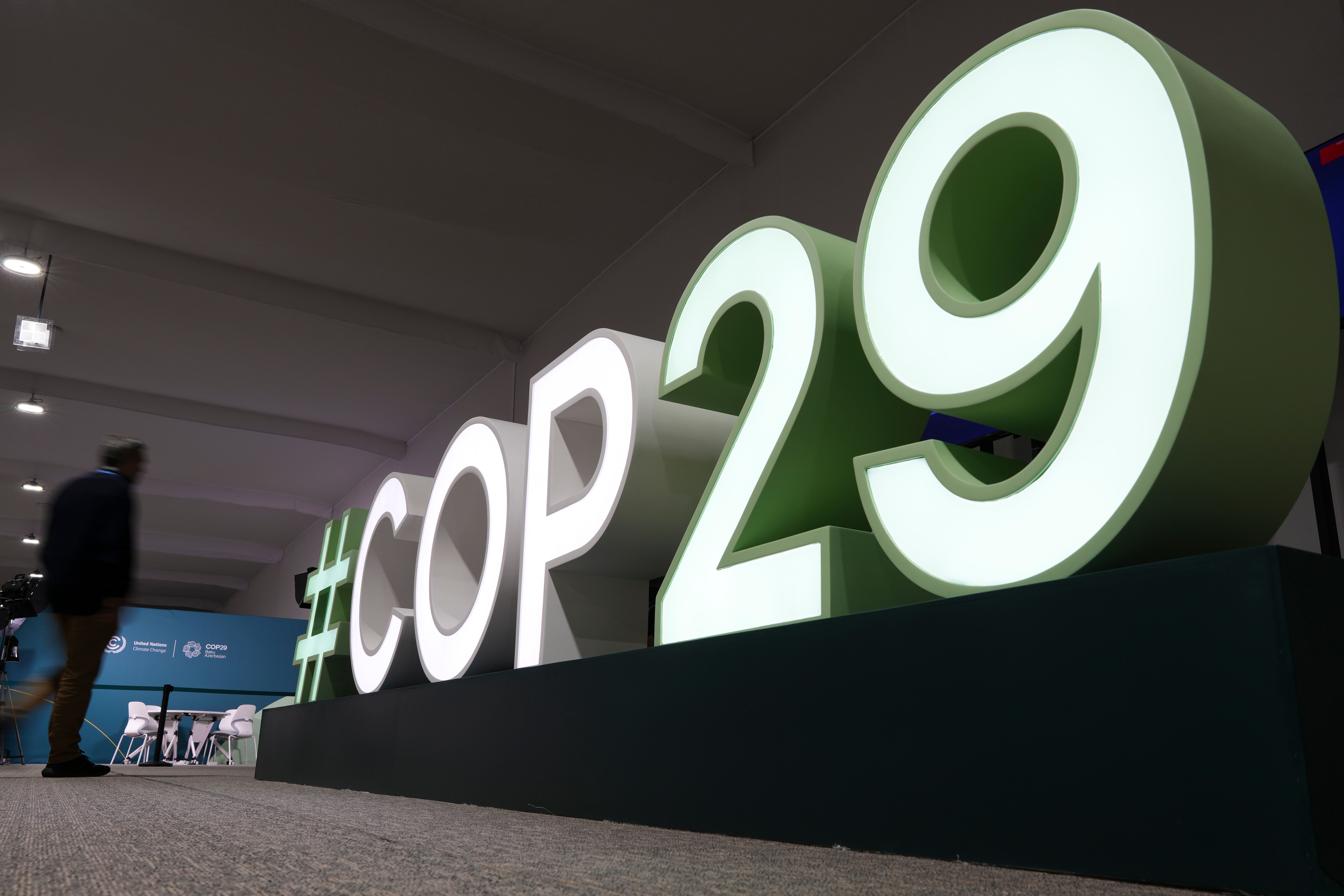UN climate talks start following deadly floods, record heat and Trump’s return
Cop29 is set to focus on finance, but will be overshadowed by the outcome of the US election.

The latest UN climate talks kick off this week against a backdrop of devastating weather extremes, record heat and Donald Trump’s re-election as US President.
World leaders including Prime Minister Sir Keir Starmer are heading to the opening summit of Cop29, in Baku, Azerbaijan, where they face pressure over delivering finance for poor countries to cope with climate change, and increasing their ambitions on emissions cuts.
The meeting is being held in the wake of the latest deadly weather events including floods in Valencia and Hurricane Helene in the US, which scientific analyses show were made more likely and intense by rising temperatures.
This year is on course to break temperature records once again and, as countries prepare to submit new plans for climate action by early next year, the UN has warned that existing policies are falling so far short the world is on track for a “catastrophic” 3.1C of warming.
Countries will also be grappling with Mr Trump’s return to the White House, in what analysts say is a trend of climate scepticism in elections this year.
The next President of the US, the world’s second biggest polluter, is expected to boost fossil fuels, roll back green incentives domestically and take America out – again – of the global Paris Agreement on tackling climate change, which commits countries to pursue efforts to curb warming to 1.5C.
In the wake of Mr Trump’s win, Helen Meech, from the Climate Coalition of environmental and society organisations, urged: “International climate action is needed more than ever to limit global warming to 1.5C and urgently deliver the finance needed to those most impacted and vulnerable to climate change.
“Ahead of Cop29, the Climate Coalition is calling on Keir Starmer to make a clear statement that the UK will commit to greater leadership on climate and nature, both at home and on the world stage, and deliver on his electoral mandate.”
Gareth Redmond-King, head of international programme at think tank Energy and Climate Intelligence Unit (ECIU), said UK ministers attending the talks need to set out an ambitious national climate plan for up to 2035, with independent advisers recommending an 81% emissions cut by then.
And ministers should tell other countries about the concrete actions backing it up, including clean energy by 2030, phasing out fossil fuel cars and delivering green farming subsidies, he said.
A key part of the negotiations in Baku will be agreeing new finance commitments for the cash that developing countries need to green their economies and cope with the already inevitable impacts of climate change.
Wealthier countries previously pledged 100 billion US dollars a year in private and public finance to help poorer nations, as part of efforts to secure the Paris treaty.
But they must now iron out a new finance agreement that meets Paris commitments for sufficient cash flows for cutting emissions and adapting to climate change, with experts saying one trillion US dollars needs to be flowing into developing countries each year by 2030.
Professor Nick Stern of the Grantham Research Institute on Climate Change said this is “what’s necessary to deliver on Paris”.
Champa Patel, from the Climate Group, which works with governments and businesses on global warming action, said delivering a new finance goal was “not easy as countries bicker over what is meant by climate finance, who pays into the funds, and who can access them”.
But without funding, and provision for “loss and damage” from climate impacts, the world could not meet the scale of the challenge posed by climate change, she said.
Ms Patel added: “As the recent floods in Valencia show, this isn’t a future problem, it’s the reality we live in today.”
Now is the time for forward-looking countries, from the EU to the UK and beyond, to step up and lead the global fight against climate change
However, she said, the task is made more difficult by a Trump presidency which “will likely walk back on existing financial commitments, and whose actions may embolden those seeking to weaken climate action”.
But Mr Redmond-King said the US had not been particularly helpful so far in finance negotiations, and it was not clear negotiators would necessarily have taken a victory for Kamala Harris as a signal to change that stance.
“So Mr Trump’s election, given his administration is unlikely to offer any finance, may simply mean the US becomes less relevant to these negotiations. That could leave space for others to step in and find a route to agreement at Cop29,” he said.
While money is key to what has been dubbed the “finance Cop” there is also a need – in the light of the US election – for countries to reaffirm their commitment to global cooperation, according to think tank E3G’s Harry Camilleri.
“The economic forces underpinning the global transition are unstoppable,” he said.
“Now is the time for forward-looking countries, from the EU to the UK and beyond, to step up and lead the global fight against climate change.”
Bookmark popover
Removed from bookmarks